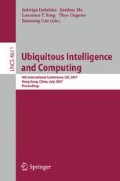Abstract
In this paper, a novel ubiquitous intelligent environment platform and its multi-agent control system are presented. The platform named Distributed Embedded Intelligence Room (DEIR) has been constructed with embedded sensors, actuators and computing devices. All the devices are interconnected using five different physical networks. This platform aims to facilitate realistic data collection and online system performance evaluation. The multi-agent control system incorporating two machine learning algorithms, fuzzy inference and decision tree, has been designed to conform to DEIR architecture. Devices to be controlled are classified based on their possible output states and modelled separately by fuzzy inference agents and decision tree agents in the system. The multi-agent control system with hybrid intelligence shows 11% improvements on overall control accuracy and 84% improvements on learning time compared to its predecessor control system. The vast improvement on computational time shows suitability of the approach towards real-time, embedded applications.
Access this chapter
Tax calculation will be finalised at checkout
Purchases are for personal use only
Preview
Unable to display preview. Download preview PDF.
References
Augusto, J.C., Nugent, C.D. (eds.): Designing Smart Homes. LNCS (LNAI), vol. 4008. Springer, Heidelberg (2006)
Ducatel, K., Bogdanowicz, M., Scapolo, F., Burgelman, J.-C.: Scenarios for Ambient Intelligence in 2010. Information Soc. Technol., Advisory Group (ISTAG), Inst. Prospective Technol. Studies (IPTS), Seville (2001)
Philips, B.A.: Metaglue: A Programming Language for Multi-Agent Systems. In: M.Eng. thesis, MIT, Cambridge, MA, USA (1999)
Gajos, K.: A Knowledge-Based Resource Management System For The Intelligent Room. In: M.Eng. thesis, MIT, Cambridge, MA, USA (2000)
Peters, L.S.: Hyperglue: An Infrastructure for Human-Centred Computing in Distributed, Pervasive, Intelligent Environments. In: PhD thesis, MIT, Cambridge, MA, USA (2006)
Doctor, F., Hagras, H., Callaghan, V.: A Fuzzy Embedded Agent-Based Approach for Realizing Ambient Intelligence in Intelligent Inhabited Environment. IEEE Trans. Sys. Man Cybern. 35(1), 55–65 (2005)
Mozer, M.: The neural network house: An environment that adapts to its inhabitants. In: Proc. Amer. Assoc. Artif. Intell. Spring Symp. Intell. Environ., pp. 110–114 (1998)
Brumitt, B., Cadiz, J.J.: Let There Be Light! Comparing Interfaces for Homes of the Future. Microsoft Research, Redmond, WA 98052, MSR-TR-2000-92 (2000)
Ambient intelligence for the networked home environment (Amigo) (January 2007), http://www.hitech-projects.com/euprojects/amigo/index.htm
Parkka, J., Ermes, M., Korpipaa, P., Mantyjarvi, J., Peltola, J., Korhonen, I.: Activity Classification Using Realistic Data From Wearable Sensors. IEEE Trans. Info. Tech. in Biomedicine 10(1), 119–128 (2006)
Papageorgiou, E., Stylios, C., Groumpos, P.: A Combined Fuzzy Cognitive Map and Decision Trees Model for Medical Decision Making. In: Proc. of the 28th IEEE EMBS Annual Int. Conf, pp. 6117–6120. IEEE Computer Society Press, Los Alamitos (2006)
Wang, K.I., Abdulla, W.H., Salcic, Z.: Distributed Embedded Intelligence Room with Multi-agent Cooperative Learning. In: Ma, J., Jin, H., Yang, L.T., Tsai, J.J.-P. (eds.) UIC 2006. LNCS, vol. 4159, pp. 147–156. Springer, Heidelberg (2006)
Wang, K.I., Abdulla, W.H., Salcic, Z.: Multi-agent fuzzy inference control system for intelligent environments using JADE. In: Proc. of 2nd IET Int. Conf. on Intel. Environ., pp. 285–294 (2006)
Echelon Corporation: LonWorks Overview (February 2006), http://www.echelon.com/solutions/overview/default.htm
Mitchell, T.M.: Machine Learning. McGraw-Hill, New York (1997)
Castellano, G., Fanelli, A.M., Mencar, C.: Generation of interpretable fuzzy granules by a double clustering technique. Arch. Contr. Sci. 12(4), 397–410 (2002)
Wang, L.X.: The MW method completed: A flexible system approach to data minig. IEEE Trans. Fuzzy Syst. 11(6), 678–782 (2003)
Author information
Authors and Affiliations
Editor information
Rights and permissions
Copyright information
© 2007 Springer-Verlag Berlin Heidelberg
About this paper
Cite this paper
Wang, K.IK., Abdulla, W.H., Salcic, Z. (2007). Multi-agent Software Control System with Hybrid Intelligence for Ubiquitous Intelligent Environments. In: Indulska, J., Ma, J., Yang, L.T., Ungerer, T., Cao, J. (eds) Ubiquitous Intelligence and Computing. UIC 2007. Lecture Notes in Computer Science, vol 4611. Springer, Berlin, Heidelberg. https://doi.org/10.1007/978-3-540-73549-6_102
Download citation
DOI: https://doi.org/10.1007/978-3-540-73549-6_102
Publisher Name: Springer, Berlin, Heidelberg
Print ISBN: 978-3-540-73548-9
Online ISBN: 978-3-540-73549-6
eBook Packages: Computer ScienceComputer Science (R0)

